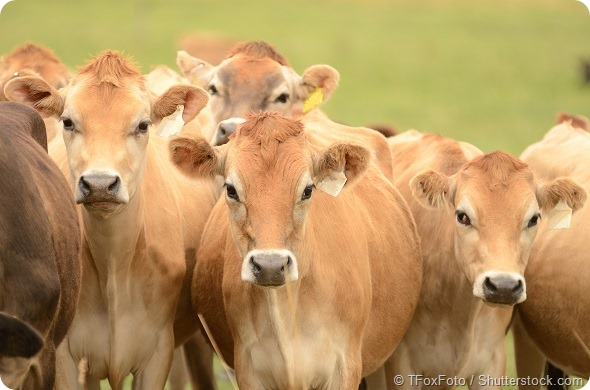Evidence of exposure to bovine leukaemia virus (BLV) has been found in human breast cancer samples. This is the first suggestion of a possible link between infection with a leukaemia virus prevalent in cows and breast cancer in humans.

BLV is a cancer-causing virus that infects blood and mammary tissue cells of cattle. It is readily transmitted between cattle; a survey conducted in 2007 by the US Department of Agriculture survey reported that all dairy operations involving at least 500 cows tested positive for BLV antibodies. However, it only causes disease in <5% of infected cattle.
Following studies in the 1970s that failed to detect evidence of human infection with BLV, it has long been believed that BLV could not be transmitted to humans, but the latest research appears to show otherwise.
Researchers at UC Berkeley analysed samples of breast tissue from 239 women, with and without breast cancer. They found BLV DNA in over half of the samples from women with breast cancer, whereas less than a third of the samples from women with no history of breast cancer showed evidence of exposure to BLV. It was calculated that the presence of BLV increased the odds of having breast cancer 3-fold compared with absence of BLV.
Lead author Gertrude Buehring highlighted that fact that:
This odds ratio is higher than any of the frequently publicized risk factors for breast cancer, such as obesity, alcohol consumption and use of post-menopausal hormones."
She added:
If BLV were proven to be a cause of breast cancer, it could shift the emphasis to prevention of breast cancer, rather than trying to cure or control it after it has already occurred.”
Links between other viruses and cancer have already been established. For example, hepatitis B virus can cause liver cancer and human papillomavirus can lead to cervical and anal cancers. Vaccines have been developed to protect against both these viruses and are routinely used to prevent the associated cancers.
This study does not show that BLV causes cancer as it is not known whether the infection occurred before or after the breast cancer. Furthermore, we do not know from where the virus came. Infection could have occurred through the consumption of unpasteurized milk or undercooked meat, or it could have been transmitted by other humans. If it proves to have come directly from bovine products, steps will need to be taken within the cattle industry to prevent the spread of BLV to humans.